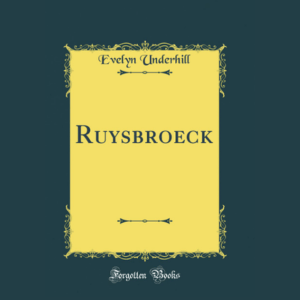Table of Contents
ToggleRuysbroeck By Evelyn Underhill: Unveiling the Mysticism and Spiritual Insights

John of Ruysbroeck, a 14th-century Flemish mystic, remains a towering figure in the landscape of Christian spirituality. Yet, his profound ideas haven’t reached as wide an audience as they deserve. Thankfully, Evelyn Underhill, a renowned scholar of mysticism herself, bridges this gap with her insightful biography, “Ruysbroeck by Evelyn Underhill.” This blog delves into the book, exploring Ruysbroeck’s life, work, and core doctrines, while also highlighting the key takeaways and the value this book holds for anyone seeking a deeper spiritual understanding.
“Ruysbroeck by Evelyn Underhill” – Book Summary
Ruysbroeck the Man: A Life of Quiet Contemplation
Underhill paints a vivid picture of Ruysbroeck’s life, one marked by devotion and introspection. Born, in the 14th Century in Belgium, into a well-to-do family, he chose the path of a canon regular, a form of monasticism while pursuing a contemplative life. Ruysbroeck embarked on a spiritual journey that would lead him to profound mystical experiences and a deep understanding of divine truths. Raised in a devout Christian family, Ruysbroeck’s early years were marked by a thirst for spiritual knowledge and a profound sense of reverence for the divine. Unlike some flamboyant mystics, Ruysbroeck shunned public displays of piety. His focus was inward, on the cultivation of a love for God that transcended outward forms.
His Work: Unveiling the Divine Mystery
Ruysbroeck’s literary output is as impressive as it is insightful. His writings, including “The Spiritual Espousals”, “The Adornment of the Spiritual Marriage” and “The Book of Supreme Truth.”, offer profound reflections on the nature of God, the soul, the human condition, and the path to spiritual realization. Drawing upon his own mystical experiences, Ruysbroeck’s works serve as beacons of wisdom, guiding readers towards deeper insights into the mysteries of existence.
His Doctrine of God: Beyond Form and Duality
Ruysbroeck emphasized the Divine Light, Love, and Nature. He explored the soul’s journey toward God through contemplation. For Ruysbroeck, God transcends human understanding, existing beyond the realm of concepts and definitions. Instead of attempting to grasp God intellectually, Ruysbroeck invites readers to enter into direct communion with the divine through contemplation and prayer.
He rejects the notion of God as a distant being, instead emphasizing God’s absolute unity and unknowability. He speaks of the Godhead as existing in three “modes” – Father, Son, and Holy Spirit – yet ultimately transcending this very division. This understanding challenges our limited human comprehension and invites us to contemplate the divine mystery.
His Doctrine of Man
Ruysbroeck’s view of human nature is equally profound. He sees humanity not as separate from God, but as inherently divine, bearing the imprint of the divine within the depths of the soul. However, sin and self-centeredness obscure this spark. The path to spiritual growth lies in stripping away these layers and returning to our true nature, which is union with God.
The Active Life: Preparing the Ground
Ruysbroeck defended historic Church customs while advocating for a balance between external practices and inner spirituality. He doesn’t advocate for a purely contemplative life. He emphasizes the importance of the “active life,” which involves living ethically, fulfilling one’s duties, and cultivating virtues like charity and humility. This active life prepares the ground for the deeper mystical experiences to take root.
The Interior Life: Illumination and Destitution
The core of Ruysbroeck’s mysticism lies in the “interior life,” the journey of the soul towards God. This journey has two stages: illumination and destitution. Illumination involves receiving divine light and insights. Destitution, a seemingly negative term, refers to the stripping away of everything not God – our ego, attachments, and even our intellectual concepts of God. This “dark night of the soul” is a necessary stage for true union to occur.
The Interior Life: Union and Contemplation
Union with God, the ultimate goal of the mystical journey, is described by Ruysbroeck as a state of ecstatic oneness with the divine. Through contemplative practices such as prayer, meditation, and inner silence, individuals can enter into this sacred union and experience the boundless love and presence of God.
Unlike some mystics, Ruysbroeck believed that the soul could find God but would always maintain its own identity, never fully unifying with God.
The Superessential Life
The culmination of Ruysbroeck’s spiritual path is the superessential life, a state of transcendence beyond all dualities and distinctions. Here, the individual abides in perfect union with the divine, experiencing the fullness of divine love and wisdom beyond words or concepts. This union leads to a state of “superessential life,” where the soul transcends even its own individuality and experiences a taste of eternity.
Key Learnings: A Journey of Transformation
Through Underhill’s masterful exploration of Ruysbroeck’s teachings, readers gain valuable insights into the nature of spirituality, the mysteries of the divine, and the transformative power of the mystical path. Key learnings include the importance of surrendering to divine grace, the significance of inner transformation, and the eternal quest for union with the divine.
“Ruysbroeck by Evelyn Underhill” offers a wealth of wisdom for anyone seeking a deeper spiritual life. Here are some key takeaways:
- Love is the essence of the divine. Ruysbroeck’s emphasis on God’s love challenges us to cultivate love in our own lives.
- The journey inward is essential. This book reminds us that true spiritual growth happens through introspection and self-knowledge.
- There is a path beyond duality. Ruysbroeck’s concept of God’s unity helps us move beyond rigid theological constructs and experience the divine mystery.
- Purification precedes union. The “dark night of the soul” may be challenging, but it’s a necessary step on the path to God.
Why One Should Read “Ruysbroeck by Evelyn Underhill”
“Ruysbroeck by Evelyn Underhill” is a captivating exploration of a mystic’s life, doctrines, and spiritual journey. Whether you’re interested in mysticism, theology, or personal growth, this book offers invaluable guidance and inspiration for the journey ahead. Ruysbroeck’s timeless wisdom speaks directly to the heart, reminding us of our inherent divinity and the boundless love that awaits us in the embrace of the divine.
Conclusion : Unveiling the Universal in the Particular
“Ruysbroeck” is not just a biography; it’s an invitation to explore the depths of the human spirit. While rooted in Christian mysticism, Ruysbroeck’s core message transcends religious boundaries. His emphasis on love, self-knowledge, and the transformative power of the divine speaks to anyone on a spiritual quest.
Frequently Asked Questions
- What makes Ruysbroeck’s teachings unique?
Ruysbroeck’s teachings are unique in their depth and clarity, offering profound insights into the nature of the divine and the soul’s journey towards union with God.
- How can readers apply Ruysbroeck’s insights in their lives?
Readers can apply Ruysbroeck’s insights by cultivating a practice of inner contemplation, surrendering to divine grace, and living in alignment with divine will in their daily lives.
- Is “Ruysbroeck” suitable for readers of all spiritual backgrounds?
Yes, “Ruysbroeck” is accessible to readers of all spiritual backgrounds, offering universal truths that transcend religious doctrines and dogmas.
- Are there any modern interpretations or commentaries on Ruysbroeck’s work?
Yes, several modern scholars and mystics have offered interpretations and commentaries on Ruysbroeck’s work, shedding new light on his timeless wisdom for contemporary audiences.
- Can “Ruysbroeck” help individuals deepen their spiritual practice?
Absolutely. “Ruysbroeck” offers practical wisdom and guidance for individuals seeking to deepen their spiritual practice and awaken to the divine presence within themselves and the world around them.
